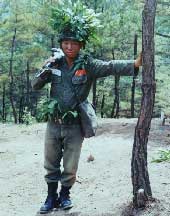 |
| South Korean businessman Kim Sun-il during military service in South Korea. (Reuters) |
Baghdad, June 21 (Reuters): Muslim militants in Iraq threatened to behead a South Korean hostage unless his country scrapped plans to send 3,000 more troops — a demand rejected by Seoul.
A videotape aired on al Jazeera television last night showed 33-year-old Korean businessman Kim Sun-il pleading for his life. A banner in the background named his captors as Jama’at al-Tawhid and Jihad, the group led by Abu Musab al-Zarqawi, a Jordanian accused of links to al Qaida. “Please get out of here,” Kim begged, referring to South Korean troops already in Iraq. “I don't want to die.”
Kim, an Arabic speaker and evangelical Christian who has worked in Iraq for a year as a translator for a Korean firm supplying goods to the US military, was seized in Falluja on June 17, the day before Seoul announced its troop plan.
“We ask you to withdraw your forces from our land and not to send any more troops, and if not we’ll send you this Korean’s head,” one of a group of armed, masked men standing around the terrified South Korean said in the videotape.
The group said Seoul had 24 hours to comply.
The threat to kill Kim came a day after a US air strike on Falluja on what the American military said was a house used by Zarqawi’s followers in the volatile town west of Baghdad.
Local Iraqi officers said women and children but no foreign Muslim militants were among the 22 people killed in the attack. The raid shattered a lull in Falluja and fuelled tensions before the formal end of Iraq’s US-led occupation on June 30.
In Ramadi, another restive city west of Falluja, four US soldiers were killed by insurgents, witnesses said. Their bodies lay sprawled on the ground. The US military had no immediate information on the attack.
North of Baghdad, a roadside bomb attack on a convoy near Mosul killed four Iraqis and wounded four, the US army said. Witnesses said the dead Iraqis worked for a security company.
Insurgents, thought to include Saddam Hussein loyalists, Sunni nationalists and foreign militants, have sought to disrupt the handover to Iraq’s new interim government with bombings, killings and attacks on the oil industry, its economic bedrock.
Sabotage last week halted all oil exports, but officials said they resumed today after repairs to one of two pipelines blown up in southern Iraq. The sabotage had choked off about 1.6 million barrels of daily exports from two Gulf terminals.
The violence wracking Iraq has torpedoed Washington’s hopes that last year’s invasion to topple Saddam would lead swiftly to stability, peace and reconstruction.
Nine-tenths of Iraqis now view US-led troops as occupiers, not liberators, according to an opinion poll taken for the occupation authority in late April, just as a scandal over abuses of Iraqi prisoners by American troops was breaking.
Three soldiers charged with abuses at Abu Ghraib jail faced initial hearings in Baghdad today, reviving images of sexual and physical humiliation that sparked worldwide outrage.
The photographs of smirking American soldiers tormenting naked detainees have rocked the US military and prompted critics to argue that policies adopted in President George W. Bush’s “war on terror” encouraged the cruelty.
The hearing that began today, at a convention centre built by Saddam, aims to resolve any outstanding legal issues before the court-martial of Specialist Charles Graner, Staff Sergeant Ivan Frederick and Sergeant Javal Davis. Judge Colonel James Pohl agreed to a request by the defence to interview Central Command chief John Abizaid and top Iraq commander Lieutenant General Ricardo Sanchez.
Judge Pohl also agreed to a defence request that Abu Ghraib prison should not be demolished as it was a “crime scene”. Bush has said the prison will be torn down. Davis’ defence counsel Paul Bergrin said he wanted court members to see Abu Ghraib for themselves.
“We want the court members to smell the faecal matter and the urine that service members who worked inside that prison and who are accused in this case had to live with,” he said.
Islamic militants have seized on the Abu Ghraib scandal and the detention of hundreds of Muslim suspects without charge at the US base in Guantanamo Bay, Cuba, as pretexts for revenge.











